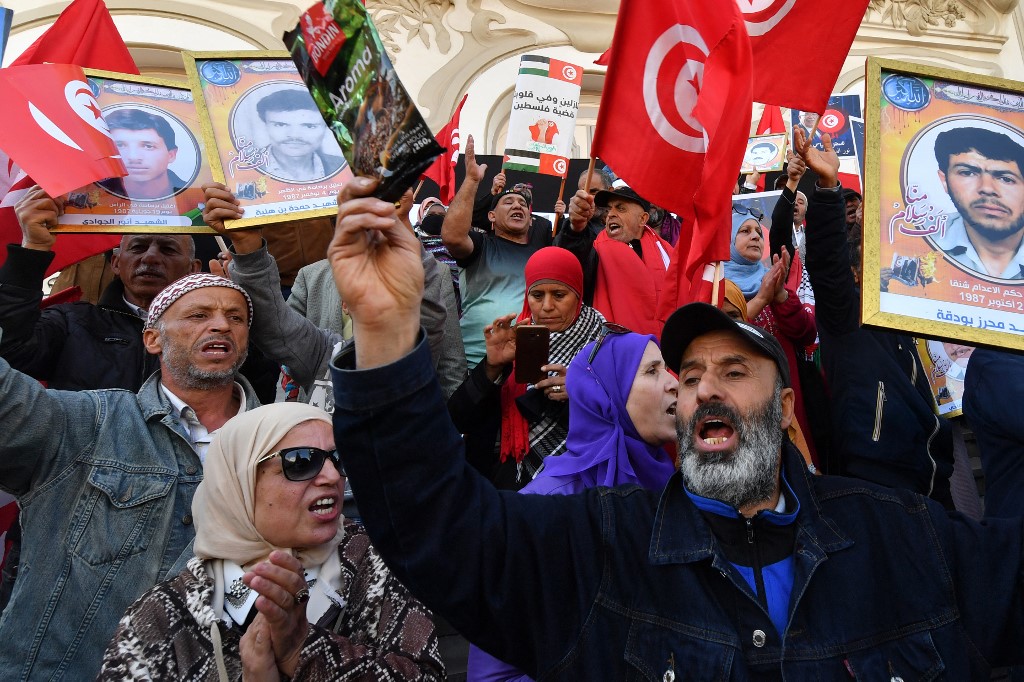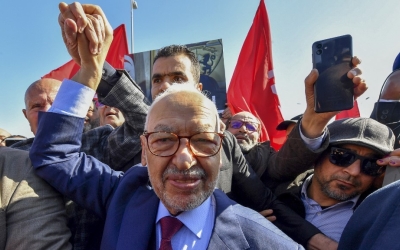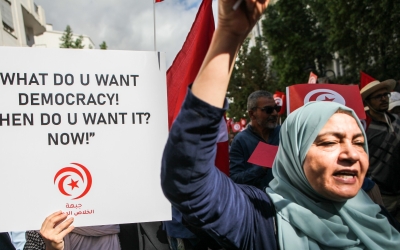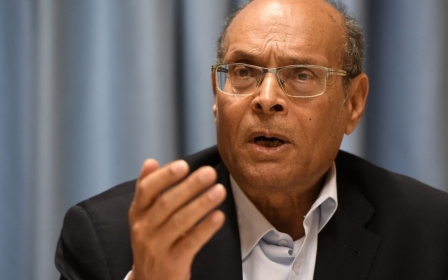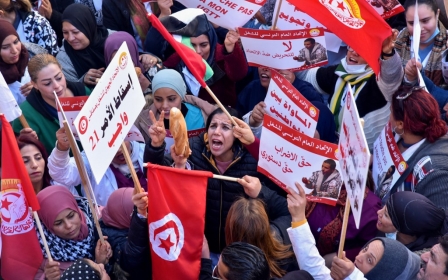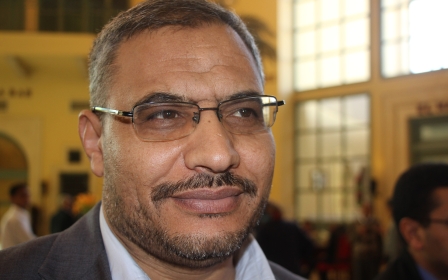Tunisia: Hunger-striking political leader 'between life and death'
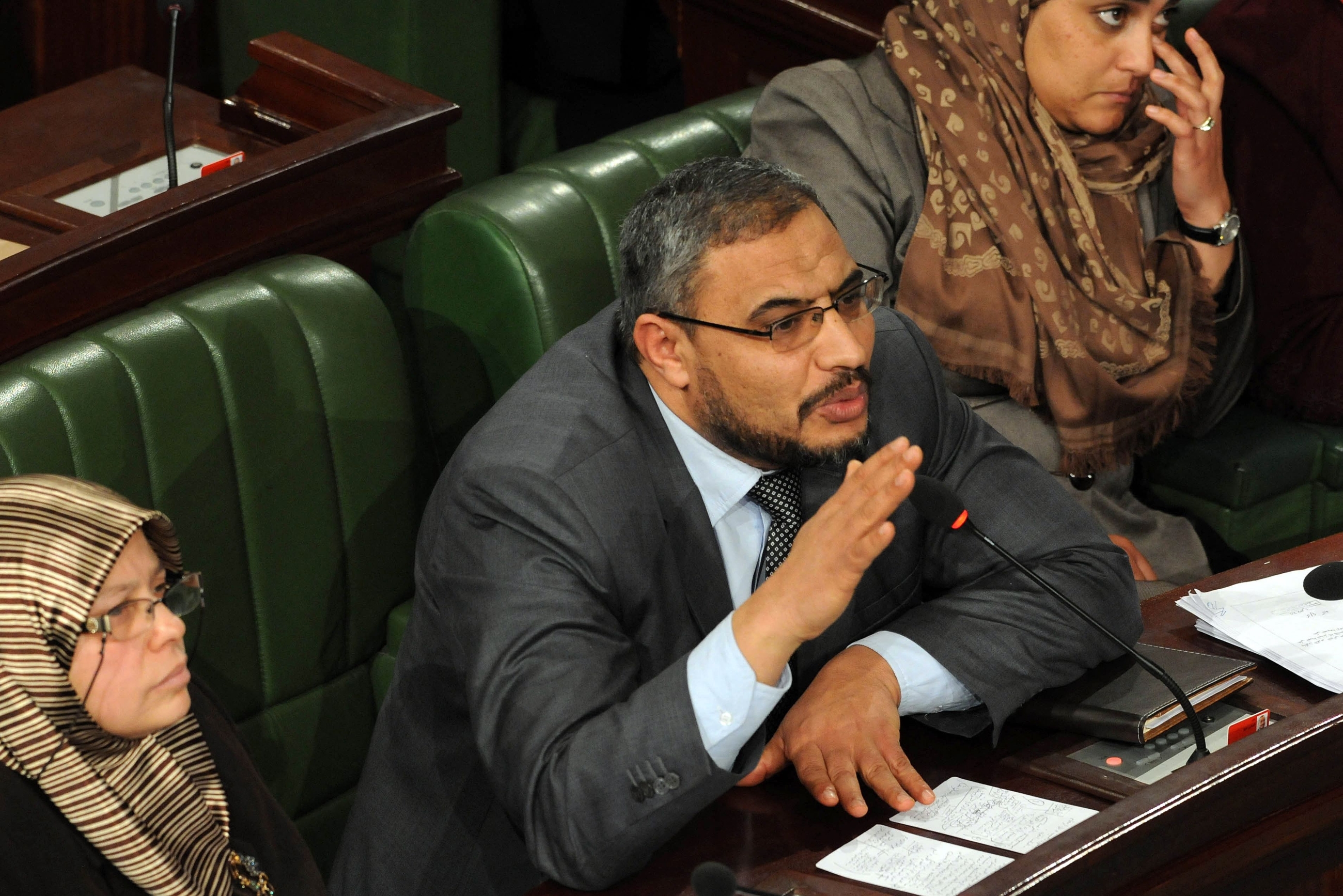
On 12 May, Sahbi Atig announced that he was going on a hunger strike. It was a result of the senior Ennahda party leader's own sense of deep injustice, but the experience has put his health in serious jeopardy.
Atig has been caught up in Tunisian President Kais Saied's authoritarian crackdown on the party and other wings of the country's opposition when he was arrested on 6 May.
He was placed in a cell with a dozen other prisoners who smoked, despite Atig's own asthma, according to his wife.
A combination of that, along with more than a month on hunger strike, has led to severe health complications and Atig's admission to intensive care.
"My husband has lost about 20kg and has started having heart problems," Atig's wife, Zeineb Mraihi, told Middle East Eye.
New MEE newsletter: Jerusalem Dispatch
Sign up to get the latest insights and analysis on Israel-Palestine, alongside Turkey Unpacked and other MEE newsletters
"He is 64, not a young man anymore, and his body had already been weakened by the 17 years he spent in jail under [former Tunisian President Zine El Abidine] Ben Ali."
And yet, even with the serious health problems that Atig now suffers from, the El Mornaguia prison administration has refused to allow him to stay in hospital and returned him to prison on Tuesday, the day after he was admitted to intensive care.
Mraihi explained the danger her husband now faces.
"If he falls ill while in prison, there's more than enough time for him to pass away [on the journey] to hospital," said Mraihi, who claims that the prison administration is barely monitoring Atig's health, apart from measuring his blood pressure.
For now, half a litre of water a day is the only sustenance Atig gets.
"On Monday, he fainted when I was visiting him," Mraihi said. "On Friday, when I saw him, he could barely speak and he was falling down. I had to lean down to hear him."
Mraihi added that Atig could no longer walk unassisted and relied on two other inmates to help him move.
"He is between life and death. Every minute that passes, I expect to hear of his passing."
'Empty case file'
Despite the fear of what might happen, Mraihi said she understood her husband's choice.
"I respect his decision to go on a hunger strike," she said. "His whole life already stopped for 17 years, while he was in prison [during Ben Ali's presidency]. Now, on top of the injustice, his reputation is [being] tainted."
The accusations levelled against Atig are at the heart of his current protest.
Atig has been accused of money laundering, illegal holding of foreign currency and giving false testimony. Mraihi calls the accusations unfounded.
'Politicians and judges are being targeted and threatened. Judges are putting people in jail out of fear of being dismissed or even prosecuted'
- Karim Marzouki, Atig's lawyer
"The case file is so empty of proof, we thought he would be out pretty soon. I would never have imagined that he would be jailed for this," she said.
The case stems from an accusation in 2016 that Atig had large amounts of money kept in his home, and that a thief who had broken into the home and stolen the money had been bribed to keep silent.
Atig and his family deny the incident ever took place, and last week, the main informant withdrew his testimony.
"Sahbi Atig said he won't accept his reputation and dignity to be defiled in front of his family and the public. He chose to go on hunger strike to protest this double injustice," Atig's lawyer, Karim Marzouki, told MEE.
Mraihi now says that much of the claims related to the case are based on fabricated social media evidence.
"Since when are claims made on Facebook enough to prosecute people? Our family is not above the law. My husband's slogan has always been, 'Whoever did it should get punished, even if it was my own family'," Mraihi said, insisting that her family would not protest the accusation if there was any evidence to prove it.
Defamation attempts on social media concern almost all political prisoners in Tunisia, according to analyst Hatem Nafti.
"The authorities are prone to easily prosecuting opposition figures when it comes to defamation, but when tarnishing a political opponent's reputation, everything goes unpunished," he explained, denouncing Saied's new cybercrime law.
Human Rights Watch's Tunisia director, Salsabil Chellali, criticised the authorities' efforts to demonise Ennahda figures without proof, in several cases targeting the party's most prominent figures and closing the party's headquarters in Tunis on 18 April.
Wider crackdown
At least 30 political prisoners have been jailed in Tunisia since February 2023 according to Human Rights Watch, as President Saied continues entrenching power in his own hands, a process that started in July 2021, when he suspended parliament and dismissed the government, in what his opponents have called a "coup".
For nearly two years, Saied has been ruling Tunisia by decree, dismantling much of the hard-fought gains of the revolution that overthrew Ben Ali in 2011, such as judicial independence and freedom of expression.
In the regime's most recent attack against press freedom, a judge has forbidden media companies from covering two trials involving opposition figures, accused of conspiring against national security.
Atig's case is seen in that context. As Ahmed Neji Chebbi, the head of Tunisia's main opposition coalition, the National Salvation Front, put it: Atig's case is a reflection of "new judicial processes based on false claims".
"Ever since July 2021, the state has only been capable of oppressing its own people," Chebbi said.
According to Nafti: "For opposition figures, justice is now based on anonymous informants, who are still seen as credible, despite having repeatedly altered their claims, which are even used as evidence."
Marzouki, the lawyer, also points to political interference as the reason for Atig's current situation.
"The judge clearly isn't making decisions based on his legal discernment, but within a context where politicians and judges are being increasingly targeted and threatened. Judges are putting people in jail out of fear of being dismissed or even prosecuted," Marzouki said.
The weakening of judicial independence has been a growing trend since Saied's power grab.
In June 2022, Saied issued decrees firing 57 judges and allowing him to dismiss any magistrate, effectively "destroying judicial independence", according to Nafti. Most of the dismissed judges were later exonerated, but the Ministry of Justice refused to reinstate them to their positions.
"These blows to judicial independence reflect the government's determination to subjugate prosecutors and judges to the executive branch at the expense of Tunisians' right to a fair trial before independent and impartial judges," Chellali said.
'According to [Saied's] narrative, Tunisia is a rich country being stolen by a group of corrupt conspirators. Once they are eliminated, all will be well.'
- Hatem Nafti, analyst
The Tunisian Association of Magistrates has also denounced the unprecedented threats and pressures put on magistrates following the latest wave of arrests, highlighting the example of a judge who was suspended and later on moved for refusing to issue an arrest warrant against a suspect.
Saied himself threatened judges after accusing the opposition of causing shortages, claiming that "whoever dares to exonerate them [political prisoners] is their accomplice".
"Tunisian authorities are increasingly using repressive, vaguely-worded laws as a pretext for repression and to arrest, investigate and in some cases prosecute dissidents and opposition figures," Amnesty International's acting deputy director for the Middle East and North Africa, Rawya Rageh, has said in a statement.
The president's actions, and the crackdown on opposition figures such as Atig, are part of an effort to portray Saied as a warrior against corruption and blame the opposition for Tunisia's worsening economic conditions, according to Nafti.
"Saied's rhetoric blames the opposition for all the evils in Tunisia. Now these accusations are turned into prosecutions and used to incarcerate people, which is extremely dangerous," Nafti said.
"Saied is selling a very reassuring idea, which partly explains why he is still popular. According to his narrative, there are no structural issues. Tunisia is simply a rich country being stolen by a group of corrupt conspirators. Once they are eliminated, all will be well."
One study has estimated that corruption cost Tunisia four percent of its GDP in 2022.
But concrete results from Saied's crackdown on corruption have yet to be seen.
Amid this crackdown, Saied is still receiving financial support from European countries, willing to bail him out in exchange for migration control and the maintenance of a strong and stable regime in Tunisia.
Internal support for Saied does not seem to waver, as a strong alternative has yet to appear, according to Nafti. Opposition also remains somewhat divided, while not all political prisoners are treated equally.
"With a public opinion so hostile against the old political class, especially Ennahda, some opposition figures fear taking a strong stance and being accused of working for the party," he said.
"With the current state of the judicial system... there will always be doubts regarding the accuracy of the trials. Even if someone is guilty and prosecuted for actions they committed, I would still consider them a political prisoner within the current justice system and its lack of independence."
This article is available in French on Middle East Eye French edition.
Middle East Eye delivers independent and unrivalled coverage and analysis of the Middle East, North Africa and beyond. To learn more about republishing this content and the associated fees, please fill out this form. More about MEE can be found here.


